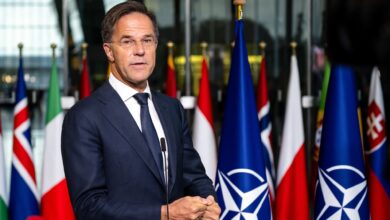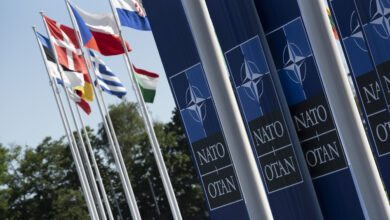Ministers from 23 EU member states on Monday signed a joint notification on the Permanent Structured Cooperation on defense (PESCO) and passed it to the High Representative and the Council.
PESCO aims to improve EU coordination on defense and weapons systems development.
Historic moment for #EU defence: 23 member states signing joint notification on Permanent Structured Cooperation #PESCO, in presence of #EU HRVP @FedericaMog pic.twitter.com/HrTl0jObUI
— Maja Kocijančič (@MajaEUspox) November 13, 2017
According to a European Council press release, the member states who signed the joint notification are: Austria, Belgium, Bulgaria, Czech Republic, Croatia, Cyprus, Estonia, Finland, France, Germany, Greece, Hungary, Italy, Latvia, Lithuania, Luxembourg, the Netherlands, Poland, Romania, Slovakia, Slovenia, Spain and Sweden.
Denmark, Ireland, Malta, Portugal, and the United Kingdom did not sign the document, although it is possible for other states to join PESCO later. The agreement also includes provisions for non-EU members to participate in specific projects.
The PESCO deal is part of a push from Germany and France for enhanced defense cooperation and follows the announcement in June of a €5.5 billion ($6.4 billion) European Defence Fund.
In September, French President Emmanuel Macron laid out plans for what he dubbed a European common defense force that would be operational within the next decade.
The possibility of the Permanent Structured Cooperation on defense was introduced by the Lisbon Treaty and enables EU member states who sign up to work to jointly develop defence capabilities, invest in shared projects, and enhance the operational readiness and contribution of their armed forces, the release said.
The joint notification says that PESCO is a “binding and inclusive European legal framework for investments in the security and defence of the EU’s territory and its citizens.”
It lists commitments the member states have agreed to undertake, including “regularly increasing defence budgets in real terms in order to reach agreed objectives,” along with proposals on PESCO governance.
States who signed pledge to provide “substantial support” in areas including personnel, equipment, training and infrastructure” for EU military missions.
The Council must adopt a decision establishing PESCO by reinforced qualified majority which could happen at the next Foreign Affairs Council meeting on December 11.
Speaking ahead of the signing, the EU’s High Representative and Vice President Frederica Mogherini said that more than 50 concrete defense cooperation projects had already been proposed.
“I expect the next Foreign Affairs Council to adopt this formal decision so that we will be able to launch,” Mogherini said. “In December, with [NATO Secretary General Jens] Stoltenberg, we will present the second report on our common activities, more than 42 concrete measures that have already been implemented, and we will also look at the future fields for cooperation.”
“Military Schengen” plan to be proposed by March
On Friday, the European Commission said that it along with EU High Representative and Vice President Federica Mogherini will propose a plan on military mobility in Europe by March 2018.
The Action Plan on Military Mobility – dubbed the “military Schengen” – has long been sought by NATO and by some EU member states. It will suggest recommended actions and “timelines on how to address identified barriers hampering military mobility in European territory” for endorsement by member states.
EU countries commit to boosting #EUDefence today. Together we can deliver the security our citizens need #PESCO https://t.co/2mmZy73U9c pic.twitter.com/6obV4cfY0V
— European External Action Service – EEAS
(@eu_eeas) November 13, 2017













